“Don’t keep the faith. Spread it around.”
- JJ Johnston
In many ways, the FIGHT FOR GLORY franchise exists because JJ Johnston spent more than forty years insisting it had to.
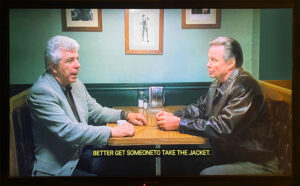
NOTE photo of Middleweight Champion Harry Greb on wall, one of JJ’s faves.
To much of the world, JJ was best-known as a ubiquitous character actor who disappeared into the skin of film and television cops, robbers, mobsters, gamblers, and private investigators. Projecting wisdom, malice, world-weariness, and ragged charm, embodying the consummate tough guy with a heart of gold, JJ played a bartender on William Shatner’s TJ Hooker, a gymnasium owner on Dynasty, a police captain on Wiseguy. He appeared briefly, though always memorably, in Oliver Stone’s JFK, Adrian Lyne’s Fatal Attraction, and David Mamet’s critically-acclaimed feature film, Homicide.
The collaboration with renowned playwright and filmmaker Mamet, a lifelong pal from Chicago, was especially meaningful for both men. As aspiring actors in the 1960s and early ‘70s, Johnston and Mamet appeared in costume at children’s parties, filled the shoes of Tweedle Dee and Tweedle Dum in an amateur stage production of Alice in Wonderland, shot the breeze, shared their dreams, plotted ways to bring the storytelling world to its knees. They became brothers and also lifelong collaborators.
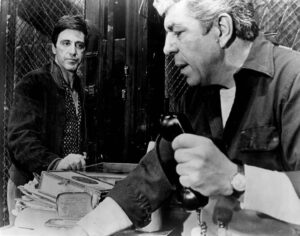
On Broadway: American Buffalo – 1983
In 1975, when Mamet penned his breakout hit, American Buffalo, JJ — “a walking lexicon of underworld phrase and fable,” according to New Yorker — was not only cast as the play’s second lead, a ne’er-do-well named Donny, but the published script was also dedicated to him. When the play to moved to Broadway in 1983, JJ shared the stage with Al Pacino, and was praised by San Francisco Examiner for his performance as “a big bear of a man, gentle and slow to anger, but fearful once roused.” After that, JJ appeared in nearly everything Mamet ever wrote for stage or screen.
But JJ Johnston was also an amateur pugilist and fight aficionado of rare fervor and intelligence. Born in Chicago in 1933, JJ narrowly missed living through boxing’s early 20th century golden age, but studied the period, its heroes and villains, with a Sherlockian meticulousness.
He was also an insatiable collector of ring memorabilia from the storied prizefighting era — magazines, newspapers, photos, illustrations, programs, ticket stubs. JJ collected the best of the best, most of it extremely rare.
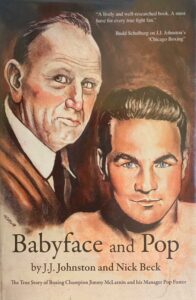
by JJ Johnson and Nick Beck
Over time, JJ became known within the boxing world as an authoritative expert on its early days, the go-to guy for a fact-check or a juicy ringside anecdote. He was a 2004 inductee in the California Boxing Hall of Fame.
He would go on to write four books on the subject: Chicago Boxing and Chicago Amateur Boxing (co-written with Sean Curtin), and Baby Face and Pop (co-written with Nick Beck), all of them beautifully illustrated with pieces from his personal collection.
JJ was also nearly promiscuous in sharing his boxing treasures — packed floor to ceiling in his garage in waterproof crates and metal filing cabinets — with other writers, historians, and fanboys.
My father, Tommy Gibbons, Jr., first born son of legendary heavyweight Tommy Gibbons, was one of many descendants of golden age boxers to benefit from JJ’s extraordinary passion and generosity. They lived two blocks from each other in Van Nuys, California. In short order, they became pen pals, walking mates, lunch dates, and fast friends. Their chatter excitedly reminisced the careers and exploits of boxing greats such as Jim Corbett, Bob Fitzsimmons, Jack Dempsey, Jack Johnson, Harry Greb, Sam Langford, Benny Leonard, Johnny Coulon and Gene Tunney.
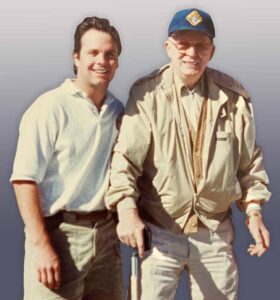
when they first met JJ Johnston in the 80s.
Gibbons FFG Archive
In the late ‘80s dad introduced me to JJ and I quickly became one of the tribe. Over decades, from film sets, stages and gymnasiums, green rooms and ringside from coast to coast, JJ sent my father and I countless envelopes and packages full of boxing treasures — old newspaper clippings, photos, and other ephemera documenting the Gibbons Brothers’ ring adventures. The rare items that JJ shared allowed my dad to know more completely his own father, always his hero, even long after my grandfather Tommy took the final count in 1960. I saved every communication from JJ not realizing where it would all lead decades later. The savoring of his offerings would have to wait until I was of a mind to appreciate it. Funny how life often works this way.
JJ was a lifelong fan of Mike and Tommy Gibbons, whom he dubbed “the shining knights of boxing” in a 1997 letter he wrote advocating their induction into the World Boxing Hall of Fame.
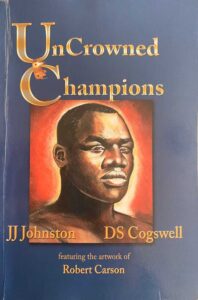
by JJ Johnston and DS Cogswell
In his fourth book, 2011’s Uncrowned Champions, praised by boxing historian and author Mike (The Arc of Boxing) Silver as “thoroughly researched, entertaining, and insightful… a treasure trove of heretofore unknown facts, photos and details concerning some of the greatest fighters of all time,” JJ devoted a full chapter to my great-uncle Mike, the St. Paul Phantom.
JJ also wrote many times about Mike and Tommy for a raft of boxing newspapers and periodicals. JJ heralded Mike’s “smooth gliding motion (in the ring) and near-perfect footwork.” He wrote: “(The Phantom) always looked as though he was wearing roller skates (when he battled). Even at ringside, you weren’t aware that he was moving his feet. He kind of glided around like he was on casters. It was downright amazing.”
He was equally dazzled by Tommy Gibbons’ ring work, writing, “Tommy was one of the all-time greats who fought the best of his era. One of the brightest lights in the fistic world, Tommy fought for glory… not for himself but for God, family, community and country. He was a hero to many and a credit to boxing inside of the ring and out.”
JJ knew what he shared with my father and I was pure gold, but I’m not sure he ever knew how much that treasure meant to my father — and, eventually, to me as well.
When my dad passed in 1999, he left me a brick wall of heavy cardboard boxes. I would come to discover that most of this trove was my grandfather’s archive, a good portion of my great uncle’s records along with the sweetened additions of JJ’s offerings. Caught up in the rat race of career and family, and also processing my deep grief over losing Dad (always my hero), I never bothered opening the boxes. Afterall, I figured that our boxing and family history was my dad’s purpose. Without knowing what they held, I simply lugged them around from place to place, then put them into storage. Meanwhile I had lost touch with JJ who had moved away. The trail had gone cold.
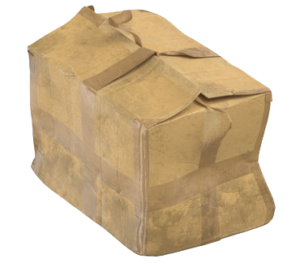 Fifteen years later, when life, time and curiosity suddenly converged, I finally opened the very first box. The experience was revelatory, deeply emotional, and instantly motivating in a way I’d never felt before. An epiphany! I sensed history at my fingertips. Treasure. A time machine to a golden past that begged a renaissance in the future. FIGHT FOR GLORY was born right then and there.
Fifteen years later, when life, time and curiosity suddenly converged, I finally opened the very first box. The experience was revelatory, deeply emotional, and instantly motivating in a way I’d never felt before. An epiphany! I sensed history at my fingertips. Treasure. A time machine to a golden past that begged a renaissance in the future. FIGHT FOR GLORY was born right then and there.
That same day I set out determined to find JJ. I needed to see him, tell him how much I appreciated what he did and how much he meant to my father and I, and to let him know of my mission to pursue this story. Was he even still alive? I had not a clue. Finding an address on the old letters, I drove to Van Nuys, knocked on the door and quickly discovered he’d moved away a decade earlier. When a web search went empty, I cold-emailed California boxing historian David Martinez who was a complete unknown to me. It’s a blessing (Thank you David!) that the answer to this one appeal allowed me within days to locate and call JJ. Shortly thereafter, I was able to embrace the sturdy, yet fragile, octogenarian in his living room.
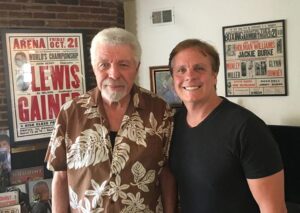
Gibbons FFG Archive
From that moment, JJ and I became reconnected and deeper friends. We wrote each other often, his letters always signed-off with his motto: “Don’t keep the faith. Spread it around.” We met occasionally at his home. He endured every question I had about my family of fistic legends, served as my personal tour guide, counselor, and gatekeeper to the fight world of a century ago. He watched the FFG literary franchise explode to life — first in my imagination, and then on the written page. I have to believe that JJ Johnston always knew things would play out this way, that FIGHT FOR GLORY was a book he never intended to write, but always hoped he’d read — especially if penned by a descendent of the Gibbons Brothers.
About two years ago, I sat with JJ in his Winnetka, California home and read him aloud two long passages from the in-progress FIGHT FOR GLORY manuscript — a preface devoted to the complicated origins of American boxing and a chapter dedicated to Jimmy Clabby, the great, tragic leather pusher and frequent opponent of my great-uncle Mike.
When I laid the pages down, JJ looked at me in silence for what felt like hours. He did not speak, but only stared. Suddenly, I realized his eyes were wet — not exactly flowing with tears, but certainly threatening.
“Took you long enough, pal,” he finally said. “But you’re doing it. The way you’re telling this story, makes me feel like I was there. I bet your dad is smiling. Now, don’t quit. Get it done!”
I asked him if he’d write the foreward to the first volume and he readily agreed.
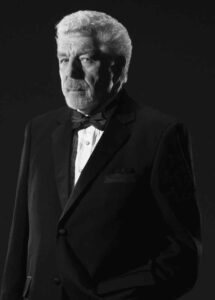
(Kevin Lynch photo)
That was the last time I saw JJ Johnston. Shortly thereafter, the global pandemic hit in 2020 just like it did one-hundred years earlier in 1918, right in the middle of my story.
When I called on October 29th about visiting him, I was surprised to hear that his number was no longer in service. Quick research revealed his house had been sold. I contacted boxing historian and founder of West Coast Boxing Hall of Fame, Rick Farris, who knew JJ in years past. A message was returned saying he might be in a nursing home. I immediately started searching for him, but it was to no avail.
Sadly, I soon discovered that he was no longer here at all. Within seven days the news broke. JJ passed away in Chicago on November 4, 2022 at the age of 89,
He continues to live on, not only in FIGHT FOR GLORY, but in the hearts of everyone he ever inspired.
A couple years after we first met, JJ told me the story of a golden age boxing tradition that was established in 1924, when Billy Miske — the St. Paul Thunderbolt (and lifelong heavyweight nemesis of Tommy Gibbons) — passed away. “The crowd was brought to its feet, hats off, held over hearts,” JJ recounted. “They stood like that for ten-seconds of silence, and then the timekeeper tolled off ten-seconds on the ringside bell. They gave Miske the final count that night, and the tradition kind of stuck.”
In honor of the truly singular JJ Johnston, so deeply loved and appreciated, who changed the course of my very life and second only to my father, inspired me to write the FIGHT FOR GLORY books, may we bow our heads and hear, however faintly in the distance, the ringside bell counting down, ushering him from one world to the next.
When we all inevitably join JJ on the other side, we can count on one thing: JJ Johnston will know the people and the turf, all the best stories, and he’ll be bursting with joy and enthusiasm to share it all. He wouldn’t have it any other way.
Dear JJ, I am truly grateful for the love, inspiration and encouragement that you shared with dad and I. Thank you for being patient as I sorted out my calling to take on this story. You set me on a path that changed my life. Thank you, pal.
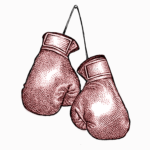





1 thought on “Requiem for a Heavyweight: JJ Johnston Takes The Final Count”
Gerard, what a beautifully written tribute to my father. My name is Jamie, I am the son of jj. Call me anytime,friend.